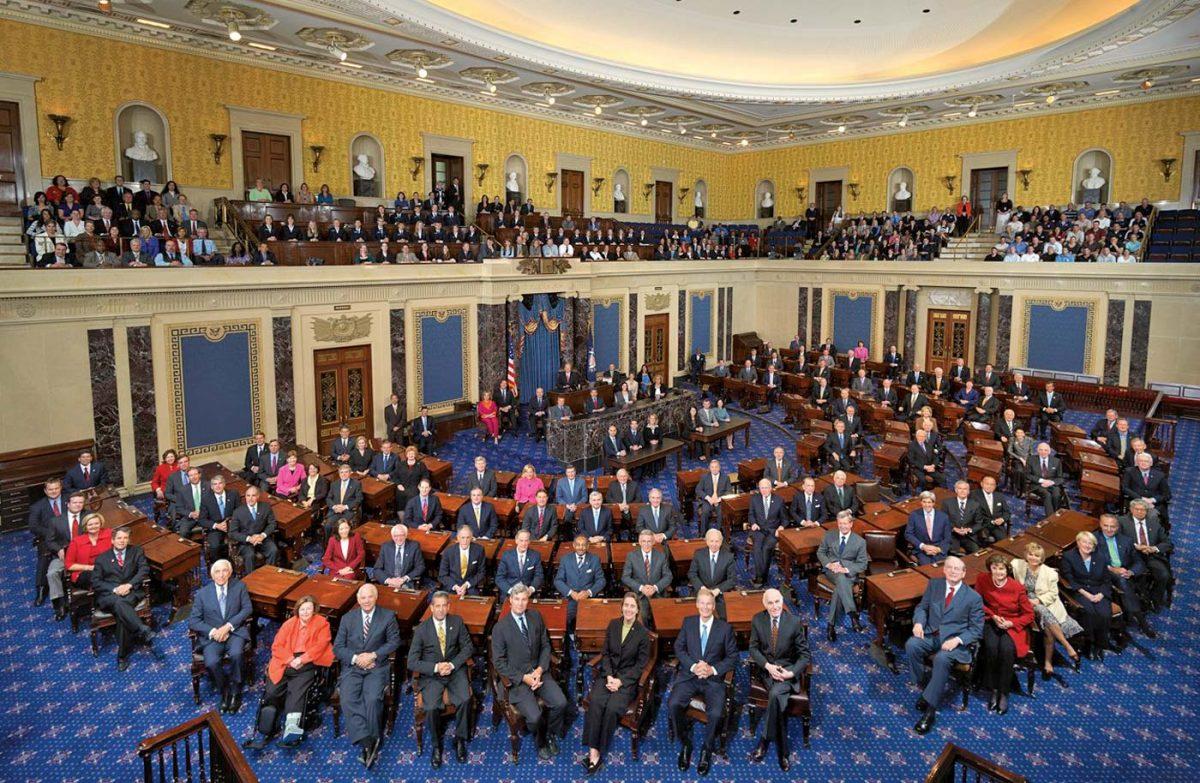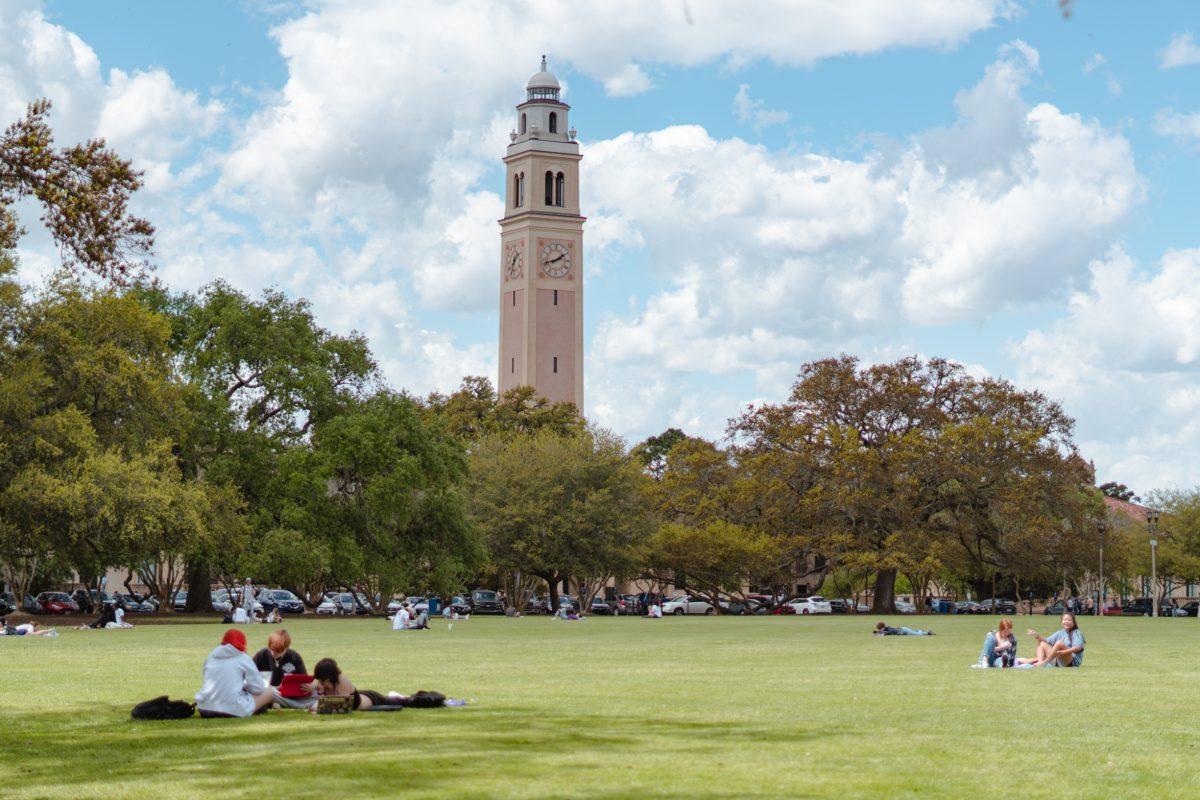The five leading candidates for retiring U.S. Sen. David Vitter’s seat met onstage at Louisiana Tech University for Louisiana’s only Senate debate. Republican U.S. Representatives John Fleming and Charles Boustany and Republican State Treasurer John Kennedy joined Democrats Caroline Fayard, a lawyer from New Orleans, and Public Service Commissioner Foster Campbell.
The candidates addressed several issues important to college students during the hour-and-a-half event hosted by Louisiana Public Broadcasting, including healthcare, compromise and the environment. Based off their responses in the debate, the candidates’ positions are summarized below:
What specific changes, if any, would you make to the Affordable Care Act?
Kennedy: “I think that the ACA, the Affordable Care Act, has been an abysmal failure. I’d tear it up by the roots and start over. Americans deserve a patient-centered healthcare delivery system that looks like somebody designed it on purpose. We need more choice. We need more competition.”
Fayard: “The Medicaid expansion has been a good decision for Louisiana. It’s estimated that this Medicaid expansion number is going to provide $1 billion annually in economic drivers to our economy. We literally are saving lives by bringing our tax dollars home.”
Campbell: “There’s some things about it we need to fix. First of all, we need to attract younger people in the program to spread the risk. Small businesses are having problems with it. Let me tell you something. If you appeal the Affordable Care Act, it would never be put back on the books again. I’m not willing to do that.”
Boustany: “We have to keep our eye on the ball. We want high-quality healthcare at the lowest possible cost. We need competition to bring those costs down, and we need to put the family back in control of their health care destiny.”
Fleming: “Being there during the Obamacare debate, I warned everybody. Ladies and gentlemen, we cannot fix something that has a terrible foundation. We need move forth into the 21st century and have patient-centered care and make sure that we give the choices and the options to the doctor.”
Would you be the type to stick to your guns or work to compromise?
Campbell: “Sometimes I’ve been hard to compromise on things that I really believe in. But I’ve been very successful as a politician. I think you have to know how to compromise and work with people. I served with David Vitter. He had very, very few friends, and very few friends in the United States Senate. I don’t want to do that. I want to go to the Senate and make friends.”
Boustany: “I believe you have to get results, and that’s been my record in public service. I stick to principles, conservative principles. I believe you have to get results. I have a record of doing this. I don’t compromise on principles, but I get results.”
Fleming: “I am always happy to compromise with people on pieces of legislation…but I will never compromise my values, the Constitution or my principles. It is one thing to get thing done, but it’s another to get the right things done. We have $20 trillion national debt. When are we going to stop compromising on that?”
Kennedy: “I think most Louisianians understand that, I try not to be rude, but I speak my mind. I’ve been willing to stand up to politicians more powerful than me, from both parties, when I thought it was in the tax payers’ interest. I’m very proud of my legislative record.”
Fayard: “I’m always going to put Louisiana’s families first. I’m always going to do what is right and in the best interest of our state. We have to compromise. I have to make deals with 99 other people, there’s a 100 people in the United States Senate. You can’t bully your way to the top. You’re going to have to stand for values. I’m not going to compromise on values.”
How would you balance Louisiana’s industry needs with the environment?
Fleming: “As a strong and proven conservative, I’m very protective of our energy industry. The federal government is absolutely strangling our energy industry, and they’re doing it deliberately. I guess what they want us to do is live on…windmills and solar panels, which really don’t work. We need to let all of these forms of energy compete in the market place.”
Kennedy: “President Obama believes he can tax, spend and regulate American into prosperity, including our oil and gas industry. And apparently Congress agrees with him because for eight years, they’ve talked tough, but they haven’t done anything about it.”
Fayard: “Louisiana is an oil and gas state. We feed and fuel the nation. We also have to balance clean air and clean water and transition to energy of the future. We don’t want to be left behind as people transition to wind and solar, so we need to have an all-in approach to our energy policy.”
Campbell: “Of course regulation can be too rigid, and it can be too liberal. I’m the only one up here that will say that when the oil companies had damaged 30 percent of the coast, that they ought to pay for it. I want our state to be treated fairly. I want it to be kept clean. And I want the oil companies to pay their fair share. Nothing more.”
Boustany: “We’re from Louisiana – we’re all in the oil and gas industry. This is a vital industry for our state and for our country. I’m the only one up here who took the most important strategic step that we’ve ever taken with oil and gas in the last 50 years, and that is to vote to lift the ban on crude oil exports.”
What can you do as a Senator to help create the next generation of jobs in Louisiana?
Kennedy: “Number one, stop illegal immigration. Number two, negotiate better trade agreements. Number three…give a tax incentive to businesses to invest money in software and machinery and equipment and new plants. That’s going to create jobs. Number four, we need to encourage American businesses…to try to engage in more profit sharing. Number five, we’ve got to send our folks back to school.”
Fayard: “One of the ways you can do that is you could help small businesses. Small businesses make up over 97 percent of employers in Louisiana. If we could ease the regulatory burden and make it easier for people to start businesses, stay in businesses, and help them alleviate some of their tax burdens, they’ll be able to create more jobs.”
Campbell: “First thing we need to do is cross train our people in Louisiana. We have ups and downs in the oil business. The next thing is, we need to tell the governments when you get this money that’s coming in, save the money because it will run out one day or they’ll stop drilling. The next thing we need to do is make sure we get all the tax dollars we can get…we get them back here to try to help our educational program. And we can stop some bad trade deals.”
Boustany: “Small business startups are very, very low right now. We haven’t seen this low of a level of investment in small businesses since the 70s. We need pro-growth policies. We need trade agreements that open up markets for U.S. producers and manufacturers. That’s going to be key to getting growth and creating Louisiana jobs.”
Fleming: “The formula is very simple. Number one, we need to repeal Obamacare. Number two, we need to repeal Dodd-Frank, which is killing a community bank everyday in this country. We also need to roll back the regulations. Also, we need to reduce and simplify taxes.”
Who are you voting for in the presidential race?
Fleming: “I am voting for Donald R. Trump.”
Kennedy: “Donald Trump.”
Fayard: “Secretary Clinton.”
Campbell: “The Democratic nominee.”
Boustany: “Donald Trump.”
If you do not make the runoff, who will you support?
Fleming: “Well, I will support the Republican, if a Republican is in the runoff.”
Kennedy: “The Republican.”
Fayard: “I would likely support the Democrat.”
Campbell: “The same.”
Boustany: “I would support the Republican.”









